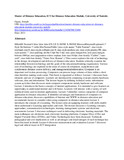| dc.contributor.author | Ogutu, Joseph | |
| dc.date.accessioned | 2013-06-14T06:30:15Z | |
| dc.date.available | 2013-06-14T06:30:15Z | |
| dc.date.issued | 2011 | |
| dc.identifier.citation | Ogutu, Mrjosephonyango. 2011. Master Of Distance Education, Ict For Distance Education Module, University Of Nairobi.. A Paper Presented At The Kim School Of Management,3rd Annual International Conference On Industry And Higher Education, September, 28th -30th , 2011.. : Univeristy Of Nairobi Press | en |
| dc.identifier.uri | http://profiles.uonbi.ac.ke/jogutu/publications/master-distance-education-ict-distance-education-module-university-nairobi | |
| dc.identifier.uri | http://erepository.uonbi.ac.ke:8080/xmlui/handle/123456789/33494 | |
| dc.description.abstract | 800x600 Normal 0 false false false EN-US X-NONE X-NONE MicrosoftInternetExplorer4 /* Style Definitions */ table.MsoNormalTable {mso-style-name:"Table Normal"; mso-tstyle-rowband-size:0; mso-tstyle-colband-size:0; mso-style-noshow:yes; mso-style-priority:99; mso-style-parent:""; mso-padding-alt:0in 5.4pt 0in 5.4pt; mso-para-margin:0in; mso-para-margin-bottom:.0001pt; mso-pagination:widow-orphan; font-size:10.0pt; font-family:"Calibri","sans-serif"; mso-bidi-font-family:"Times New Roman";}
This course explores the role of technology in the design, development and delivery of distance education. Students critically examine the relationship between technology and the goals of the educational/training organization. Various uses of technology are explored in the areas of course development, asynchronous and synchronous distance course delivery, and management/administration.
Computer is an important tool in data processing. Computers can process large volumes of data within a short time therefore making work easier. This book is organized as follows:
Lecture 1 discusses basic elements and use of computers. Learners are introduced to computing concepts mainly hardware, software, data and information. The lecture begins by defining technical terms, information system activities then discusses main computer components mainly hardware and software.
Lecture 2 introduces the basics concepts of internet applications. It is intended to give learners an opportunity to understand internet and web basics. Learners will interact with a variety of web technical terms used in internet applications.
Lecture 3 identifies various categories of computer application in distance education. It identifies advantages and limitations of computers in distance education, discusses capabilities of Internet and WWW in distance education and recommends factors to consider when using computers in distance education
Lecture 4 introduces the concept of e-Learning. The lecture aims at equipping learners with skills enable them understand e-Learning approaches and tools. The lecture discusses e-Learning concepts, approaches, communication technologies, learning management systems and electronic assessments
Lecture 5 discusses techniques used in delivering electronic learning materials. The main techniques are electronic mail, electronic learning platforms, Compact Discs (CDs) and Digital Versatile Discs (DVDs), and Video Technologies have been discussed. Technical, pedagogical and cost implication as well as advantages and disadvantages of each technique has been discussed in details
Lecture 6 discusses measurement and evaluation
Lecture 7 discusses legal and ethical issues in ICT Intergration | en |
| dc.language.iso | en | en |
| dc.publisher | University of Nairobi, | en |
| dc.title | Master of Distance Education, ICT for Distance Education Module, University of Nairobi. | en |
| dc.type | Presentation | en |
| local.publisher | School of Education | en |

